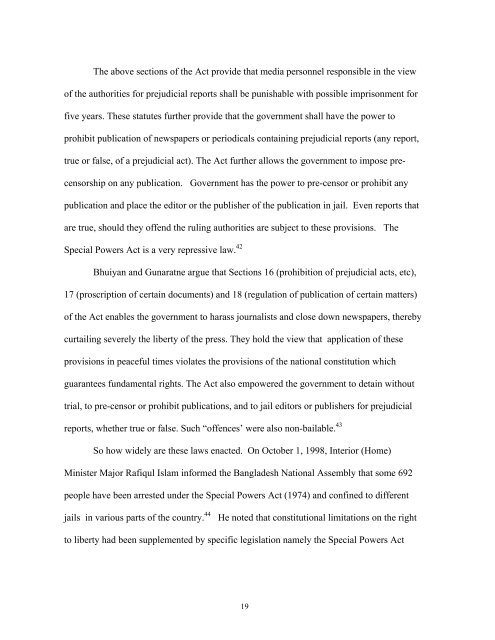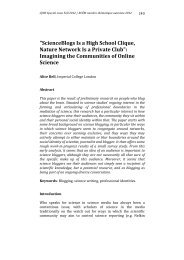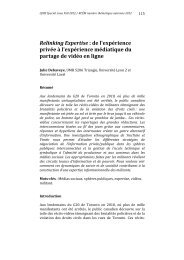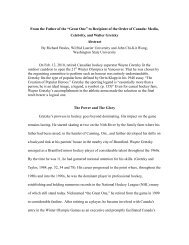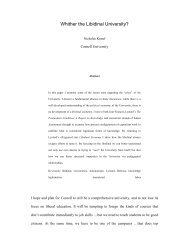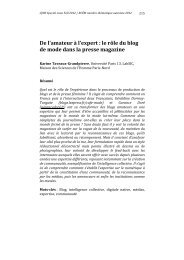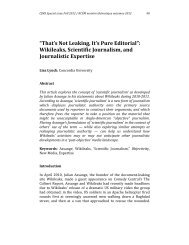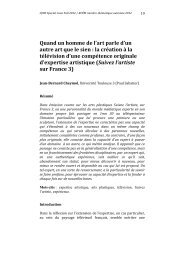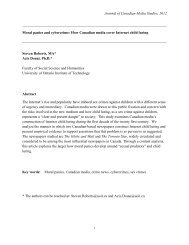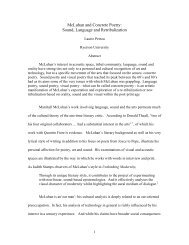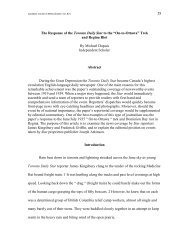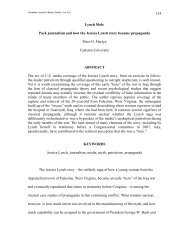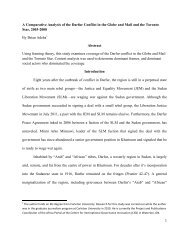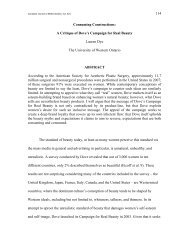Freedom of the Press and its Constraints - The Canadian Journal of ...
Freedom of the Press and its Constraints - The Canadian Journal of ...
Freedom of the Press and its Constraints - The Canadian Journal of ...
Create successful ePaper yourself
Turn your PDF publications into a flip-book with our unique Google optimized e-Paper software.
<strong>The</strong> above sections <strong>of</strong> <strong>the</strong> Act provide that media personnel responsible in <strong>the</strong> view<br />
<strong>of</strong> <strong>the</strong> authorities for prejudicial reports shall be punishable with possible imprisonment for<br />
five years. <strong>The</strong>se statutes fur<strong>the</strong>r provide that <strong>the</strong> government shall have <strong>the</strong> power to<br />
prohibit publication <strong>of</strong> newspapers or periodicals containing prejudicial reports (any report,<br />
true or false, <strong>of</strong> a prejudicial act). <strong>The</strong> Act fur<strong>the</strong>r allows <strong>the</strong> government to impose pre-<br />
censorship on any publication. Government has <strong>the</strong> power to pre-censor or prohibit any<br />
publication <strong>and</strong> place <strong>the</strong> editor or <strong>the</strong> publisher <strong>of</strong> <strong>the</strong> publication in jail. Even reports that<br />
are true, should <strong>the</strong>y <strong>of</strong>fend <strong>the</strong> ruling authorities are subject to <strong>the</strong>se provisions. <strong>The</strong><br />
Special Powers Act is a very repressive law. 42<br />
Bhuiyan <strong>and</strong> Gunaratne argue that Sections 16 (prohibition <strong>of</strong> prejudicial acts, etc),<br />
17 (proscription <strong>of</strong> certain documents) <strong>and</strong> 18 (regulation <strong>of</strong> publication <strong>of</strong> certain matters)<br />
<strong>of</strong> <strong>the</strong> Act enables <strong>the</strong> government to harass journalists <strong>and</strong> close down newspapers, <strong>the</strong>reby<br />
curtailing severely <strong>the</strong> liberty <strong>of</strong> <strong>the</strong> press. <strong>The</strong>y hold <strong>the</strong> view that application <strong>of</strong> <strong>the</strong>se<br />
provisions in peaceful times violates <strong>the</strong> provisions <strong>of</strong> <strong>the</strong> national constitution which<br />
guarantees fundamental rights. <strong>The</strong> Act also empowered <strong>the</strong> government to detain without<br />
trial, to pre-censor or prohibit publications, <strong>and</strong> to jail editors or publishers for prejudicial<br />
reports, whe<strong>the</strong>r true or false. Such “<strong>of</strong>fences’ were also non-bailable. 43<br />
So how widely are <strong>the</strong>se laws enacted. On October 1, 1998, Interior (Home)<br />
Minister Major Rafiqul Islam informed <strong>the</strong> Bangladesh National Assembly that some 692<br />
people have been arrested under <strong>the</strong> Special Powers Act (1974) <strong>and</strong> confined to different<br />
jails in various parts <strong>of</strong> <strong>the</strong> country. 44 He noted that constitutional limitations on <strong>the</strong> right<br />
to liberty had been supplemented by specific legislation namely <strong>the</strong> Special Powers Act<br />
19


